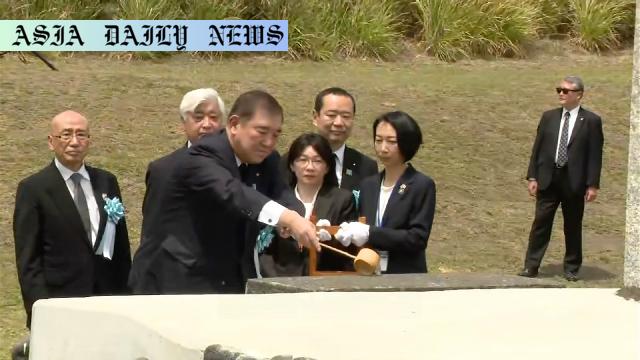Memorial: Japanese PM Ishiba stressed reconciliation at a joint Japan-US ceremony, honoring 80 years since the Iwojima battle.
Japanese PM Ishiba attended a Japan-US memorial on Ioto Island.
The memorial honored those lost in the fierce battle 80 years ago.
Ishiba highlighted the importance of reconciliation and alliance for peace.
Commitment to retrieving soldiers’ remains on the island was renewed.

Commemorating the Battle of Iwo Jima
The Japanese Prime Minister, Ishiba Shigeru, marked a significant historical milestone by attending a joint Japan-US memorial ceremony on Ioto Island, historically known as Iwojima. This solemn ceremony, which took place 80 years after one of the most intense battles of World War II, served to honor the memory of those who lost their lives on both sides. The island, located about 1,000 kilometers south of Tokyo Bay, witnessed the loss of approximately 21,900 Japanese and 6,800 US soldiers during the 1945 battle.
In his address, Ishiba expressed deep sorrow and reflected on the sacrifices made by these soldiers. He emphasized the need for Japan to face its history with sincerity, ensuring that the valuable lessons from the war are passed down to future generations. This ceremony marked a historic moment as Ishiba became the first sitting Japanese Prime Minister to attend such a memorial on the island, reinforcing the importance of paying tribute to the past.
Reconciliation and Emerging Partnerships
In his speech, Ishiba highlighted the transformation of Japan-US relations over the decades. Once fierce adversaries during World War II, the two nations have forged a profound alliance based on reconciliation and mutual respect. Ishiba noted how this alliance now anchors peace and prosperity in the Indo-Pacific region. By acknowledging the shared history and the journey of healing, Ishiba underscored the importance of such partnerships in maintaining global stability.
Following the ceremony, the Prime Minister visited significant sites on the island, including Mount Suribachi, a place of intense combat. He also observed ongoing efforts to recover the remains of over 11,000 soldiers who still rest on the island. Ishiba expressed the government’s renewed commitment to ensuring these remains are returned to families, symbolizing a broader commitment to closure and remembrance.
The Lessons of Iwojima 80 Years On
The Battle of Iwo Jima remains one of the most poignant symbols of the devastating consequences of war. Beyond its historical significance, the battle serves as a stark reminder of the human cost of conflict. Ishiba’s commitment to ensuring that the lessons of the war are preserved for future generations reflects a broader global need to remember the past while striving for a peaceful future.
Japan’s efforts to embrace its history with transparency and honesty send a powerful message to the international community. It demonstrates that true reconciliation is not just about acknowledging past conflicts but transforming those experiences into collaborative partnerships that foster peace and coexistence.
This historic memorial stands as a testament to how deeply rooted animosities can be overcome by shared values and mutual respect. Both countries’ willingness to honor the memories of their fallen soldiers together signifies the power of unity, even in the aftermath of immense tragedy.
Commentary
A Bereaved Past and a Hopeful Future
The Battle of Iwo Jima resonates as one of the most harrowing chapters of World War II. It is a story etched in pain, valor, and loss, and such moments of reflection as seen during Japanese Prime Minister Ishiba’s recent attendance at the memorial ceremony on Ioto Island, bring to focus how we can transcend the past. This event reminds us that despite deep-rooted enmity of the times, reconciliation is possible through time, shared values, and understanding.
United Through Reconciliation
What stands out in this ceremony is the vivid symbolism of unity between Japan and the United States. Two nations, once adversaries in one of history’s bloodiest wars, now stand together to commemorate their fallen soldiers. This transformation speaks volumes about the power of reconciliation. It is a powerful reminder of the importance of dialogue and collaboration in mending frayed relationships. The alliance between Japan and the US today anchors stability not only in the Pacific but across the globe. Such relationships provide hope for those living in modern conflict zones, proving that enduring peace is indeed possible with conscious effort and mutual respect.
The Significance of Remembering
Preserving the memory of those who sacrificed their lives is essential. This act of remembrance reminds every generation of the devastating impacts of war and the necessity of avoiding it whenever possible. Ishiba’s acknowledgment of the importance of passing down these lessons highlights how nations must take deliberate steps in educating their citizens about the past. It ensures that the anguish, hopes, and sacrifices of those who lived through such devastating chapters in history are never forgotten, fostering a sense of responsibility towards maintaining peace.
This memorial stands as more than just a ceremony. It is both a poignant reminder of history and a beacon of hope that nations can rebuild and emerge stronger, together. The commitment to retrieving soldiers’ remains even after 80 years further reflects a deep respect for humanity’s shared past and the importance of closure. Ultimately, this event is a testament to resilience, hope, and the enduring desire for peace.


